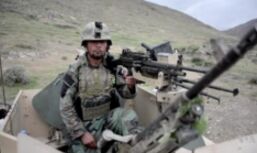正文
US Afghan Policy Not Yet Decided
Three months ago, the top commander of United States and international forces in Afghanistan met with a U.S. Senate committee.
Army General John Nicholson spoke about military operations against the Taliban. Nicholson said he needed “a few thousand” more troops to end what he called a “stalemate” in Afghanistan.
Since then, spring has returned to the country. In recent years, the warmer weather has linked to new fighting between Taliban and international forces.
Yet the U.S. administration has yet to announce its plans for Afghanistan.
Sean Spicer is a spokesman for President Donald Trump.

“No decision has been made, so let’s not get ahead of what that ultimate policy will be.”
U.S. military officials tell VOA that the Trump administration’s policy could include sending a few thousand more international troops to Afghanistan.
American and international military leaders have sent additional troops to the country in the past to fight Taliban forces. But experts say any additional troops sent in the future will be deployed differently.
Thomas Spoehr is a retired lieutenant general. He currently directs the Washington-based Heritage Foundation National Defense Center.
“This time we are directly enabling the Afghan army, so we’re trying to make that army more powerful, so it’s a different thrust than what we did in the past.”
Officials say the administration’s policy will be directed more on the needs of the international force than the number of troops. They think the administration could provide support for increased Afghan air power and special-forces.
Some experts do not believe an increase in the number of coalition troops will have an immediate effect.
Daniel Coats is the U.S. Director of National Intelligence.
“The intelligence community assesses that the political and security situation in Afghanistan will almost certainly deteriorate through 2018, even with a modest increase in military assistance by the United States and its partners.”
The Taliban now controls more territory in Afghanistan than at any time since 2001. But more military pressure could be a way to force the Taliban to begin negotiating with the Afghan government.
Officials tell VOA that Afghan forces have a goal of slow, but continuing progress over the next few years, not a fast defeat of the Taliban.
Some have criticized the Afghan military’s “stalemate” with the Taliban. But American generals say the anti-terrorism operation has been successful.
General Raymond Thomas is the head of the U.S. Special Forces Command.
“The one objective we had for why we went there in the first place that -- that we’ve accomplished over the last 15-and-a-half years -- is the avoidance of another attack from that area, and that certainly is an accomplishment and something that we need to reinforce going forward.”
The importance of the anti-terrorism operation has increased since Islamic State fighters moved to Afghanistan. Their arrival and the decision to support a long-term fight against the Taliban lead many experts to think that Trump will not seek to remove U.S. troops from Afghanistan anytime soon.
I’m Jonathan Evans.
VOA Pentagon Correspondent Carla Babb reported this story. Christopher Jones-Cruise adapted her report for Learning English. George Grow was the editor.
We want to hear from you. Write to us in the Comments Section, or visit our www.hxen.net .
相关文章
- US, Haiti Seek Release of 17 Missionaries Taken by Gang
- Drive-Up Service Helps Some Take Final Step to US Citizenship
- Quarantini? Moronavirus? COVID-10? Wordplay Brings Humor to These Times
- Argentines Find Ways to Continue Therapy Through Virus Crisis
- Advice, Modals, and Coronavirus
- Dismantling Democracy? Virus Used as Excuse
- World Leaders Turn to WWII to Inspire During Virus Crisis
- Used to, Be Used to, Get Used to的区别
- 名师问答:Trust or Believe?
- How to Say 'I'm Not Surprised'




 手机网站
手机网站